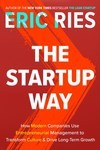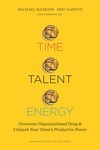Inside the Longlist: The Best Management & Workplace Culture Books of 2017
November 15, 2017
Taking a look inside five best books on management and workplace culture books published in 2017.
We redefined our awards categories last year. We found that combining leadership and management together, as we had in the past, not only led to a veritable mountain of books being submitted in that category, but also led us to miss a subtle nuance between the 10,000 foot view of the world (and a company’s place in it) necessary to set strategy, and the more intimate, hands-on managerial prowess needed to get work done on the ground. Certainly they’re closely related and will always intersect, but as Peter Drucker, widely credited as the father of management, once said: “Management is doing things right. Leadership is doing the right things.” There is a big difference. But the more I read about these topics, the more I’m inclined to think that “doing things right” is the ultimate guarantee of “doing the right thing.” It’s why we value our system of due process, why constitutional scholar Alexander Bickel once wrote, “The highest morality is almost always the morality of process.”
It is especially important in a world that is a shade of grays, where there are no easy answers. As Joseph L. Badaracco Jr. wrote in one of my favorite management books last year, Managing In the Gray:
Process is critical for gray area problems because you may never know whether you made the right decision. All you can know is that you worked on the problem the right way.
And, if there’s one theme to this year’s books on management, it’s that working on the problem the right way means working on it together.
(Speaking of working together, our head of sales and author services, Aaron Schleicher, led the internal curation of the category this year, but he has his arm in a sling due to an accident, making typing an arduous process, so I have taken over the task of writing it up for him.)

 The Loyalist Team: How Trust, Candor, and Authenticity Create Great Organizations, by Linda Adams, Abby Curnow-Chavez, Audrey Epstein, and Rebecca Teasdale, PublicAffairs
The Loyalist Team: How Trust, Candor, and Authenticity Create Great Organizations, by Linda Adams, Abby Curnow-Chavez, Audrey Epstein, and Rebecca Teasdale, PublicAffairs
The authors of The Loyalist Team are all members of such a team themselves, as the members of The Trispective Group—named such because they were formed to “address an organization’s needs from three angles.” They would coach executives, improve organization's effectiveness, and teach teams to work together better. They’ve now done so on every continent except Antarctica, and across a diverse range of industries, and the focus of their new book uses that experience to focus in on the subject of that last angle, teams. They provide a framework to assess your current team, and tell you how to, and why you should, move from a cutthroat, competitive culture to a more collaborative one built on mutual trust, in which everyone is committed to each others’ success. It is not easy, and takes as much courage and commitment as kindness and consideration, but it will make sure those in your organization are focused on competing with the forces outside of your company, rather than each other.
 Own It: The Power of Women at Work by Sallie Krawcheck, Crown Business
Own It: The Power of Women at Work by Sallie Krawcheck, Crown Business
There is a preponderance of data showing that having more women in your company isn’t just good for women, it’s good for business, good for the bottom line, good for everyone, especially if they are in positions of power. And Sallie Krawcheck is “over the whole notion of women being empowered,” advocating that women should leverage the power they already have—and the traditionally feminine qualities like social and emotional intelligence, empathy, and communication, even a more measured approach to risk, that are consistently shown to be the most valuable qualities in business today. It is not only good for the advancement of women, but for the evolution of companies and the economy, even the world. And, when they get to positions of power—which is still a painfully, unethically slow process—Krawcheck wants women to show up at work as authentically themselves, and to stop competing against their own femininity to conform to a traditionally male corporate culture, and make it better.
 Radical Candor: Be a Kick-Ass Boss Without Losing Your Humanity by Kim Scott, St. Martin's Press
Radical Candor: Be a Kick-Ass Boss Without Losing Your Humanity by Kim Scott, St. Martin's Press
Kim Scott expounds upon a conundrum she encountered early in her managerial career: “You’ve been told since you learned to talk, ‘If you don’t have anything nice to say, don’t say anything at all.’ Now all of a sudden it’s your job to say it. You’ve got to undo a lifetime of training. Management is hard.” Scott makes it a little less hard, letting you know that you’re not alone on the journey—as much as it can feel that way sometime—by sharing some of her own mistakes and those she’s witnessed managing a team of seven hundred people at Google, so you can avoid making them yourself. Her management philosophy of Radical Candor revolves around the idea that it is the emotional labor, rather than technical expertise, that you put into your working relationships that is key to being a good boss. And a lot of it boils down to something that has become second-nature in the Silicon Valley ethos she inhabits—challenging authority. But how do you accept that challenge when you are the authority? Kim Scott explains, and helps you implement that kind of consistent, considerate, and caring challenge into the cultural fabric of your organization.
 The Startup Way: How Modern Companies Use Entrepreneurial Management to Transform Culture and Drive Long-Term Growth by Eric Ries, Currency
The Startup Way: How Modern Companies Use Entrepreneurial Management to Transform Culture and Drive Long-Term Growth by Eric Ries, Currency
Eric Ries moves the focus from management on a personal level to management on an organizational level, but he also comes from Silicon Valley and its ethos of challenging existing business paradigms. The Valley has, as we all know, produced the greatest business successes of the day, and global transformation. And it has done so in a way that upends traditional business practices, creating an entirely new way to think about, structure, and account for risk, and to build companies. Seeing that there was no definitive formula for doing so, he turned his engineer’s mind to these organizational issues, and wrote one of the great management books of the last decade—The Lean Startup. The Startup Way is the follow up to that book, setting the philosophical flag behind it all more firmly in the organizational sandbox, and using the wealth of experience he’s gained advising companies big and small since the first book to further refine the process of entrepreneurial management.
 Time, Talent, Energy: Overcome Organizational Drag and Unleash Your Team’s Productive Power by Michael Mankins & Eric Garton, Harvard Business Review Press
Time, Talent, Energy: Overcome Organizational Drag and Unleash Your Team’s Productive Power by Michael Mankins & Eric Garton, Harvard Business Review Press
Michael Mankins and Eric Garton explain that, while it is accepted wisdom in business today that the pace of change is greater than ever before, organizational drag eats up more of people’s time than ever before, slowing most organizations’ productivity and ability to respond to that change. Organizational drag is “all the ways in which an organization eats up people’s time. It’s the meetings, the emails and phone calls, the bureaucratic process and procedures.” So, the stuff of modern organizational life. “Some of these are essential,” say the authors, “Others are pure time wasters.” And while I began this article by quoting a scholar stating that the “highest morality is almost always the morality of process,” that process should not be undue—or undo the ability to make real progress. To make sure it isn't, Mankins and Garton provide “a humane philosophy of the workplace,” and focus on the organizational level to counter drag and free up their people’s time, talent, and energy and unleash the organization’s full productive power.






